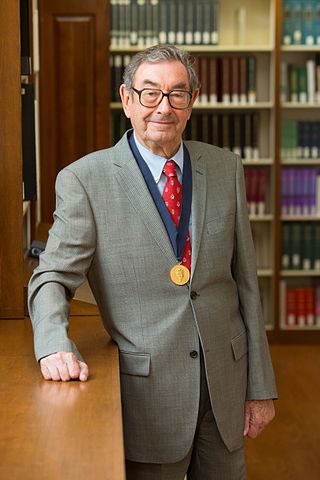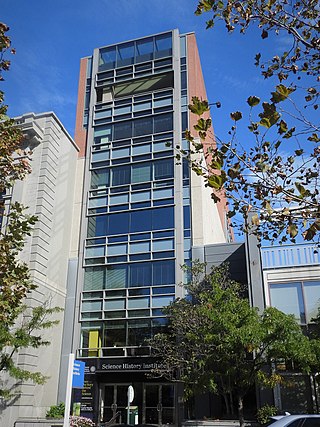
Arnold Orville Beckman was an American chemist, inventor, investor, and philanthropist. While a professor at California Institute of Technology, he founded Beckman Instruments based on his 1934 invention of the pH meter, a device for measuring acidity, later considered to have "revolutionized the study of chemistry and biology". He also developed the DU spectrophotometer, "probably the most important instrument ever developed towards the advancement of bioscience". Beckman funded the Shockley Semiconductor Laboratory, the first silicon transistor company in California, thus giving rise to Silicon Valley. After retirement, he and his wife Mabel (1900–1989) were numbered among the top philanthropists in the United States.
The Stanford University School of Medicine is the medical school of Stanford University and is located in Stanford, California, United States. It traces its roots to the Medical Department of the University of the Pacific, founded in San Francisco in 1858. This medical institution, then called Cooper Medical College, was acquired by Stanford in 1908. The medical school moved to the Stanford campus near Palo Alto, California, in 1959.

Paul Berg was an American biochemist and professor at Stanford University.

Carolyn Ruth Bertozzi is an American chemist and Nobel laureate, known for her wide-ranging work spanning both chemistry and biology. She coined the term "bioorthogonal chemistry" for chemical reactions compatible with living systems. Her recent efforts include synthesis of chemical tools to study cell surface sugars called glycans and how they affect diseases such as cancer, inflammation, and viral infections like COVID-19. At Stanford University, she holds the Anne T. and Robert M. Bass Professorship in the School of Humanities and Sciences. Bertozzi is also an Investigator at the Howard Hughes Medical Institute (HHMI) and is the former director of the Molecular Foundry, a nanoscience research center at Lawrence Berkeley National Laboratory.

Ronald T. Raines is an American chemical biologist. He is the Roger and Georges Firmenich Professor of Natural Products Chemistry at the Massachusetts Institute of Technology. He is known for using ideas and methods of physical organic chemistry to solve important problems in biology.

Harry Barkus Gray is the Arnold O. Beckman Professor of Chemistry at California Institute of Technology.

Chad Alexander Mirkin is an American chemist. He is the George B. Rathmann professor of chemistry, professor of medicine, professor of materials science and engineering, professor of biomedical engineering, and professor of chemical and biological engineering, and director of the International Institute for Nanotechnology and Center for Nanofabrication and Molecular Self-Assembly at Northwestern University.

The Science History Institute is an institution that preserves and promotes understanding of the history of science. Located in Philadelphia, Pennsylvania, it includes a library, museum, archive, research center and conference center.

JoAnne Stubbe is an American chemist best known for her work on ribonucleotide reductases, for which she was awarded the National Medal of Science in 2009. In 2017, she retired as a Professor of Chemistry and Biology at the Massachusetts Institute of Technology.
Xiaowei Zhuang is a Chinese-American biophysicist who is the David B. Arnold Jr. Professor of Science, Professor of Chemistry and Chemical Biology, and Professor of Physics at Harvard University, and an Investigator at the Howard Hughes Medical Institute. She is best known for her work in the development of Stochastic Optical Reconstruction Microscopy (STORM), a super-resolution fluorescence microscopy method, and the discoveries of novel cellular structures using STORM. She received a 2019 Breakthrough Prize in Life Sciences for developing super-resolution imaging techniques that get past the diffraction limits of traditional light microscopes, allowing scientists to visualize small structures within living cells. She was elected a Member of the American Philosophical Society in 2019 and was awarded a Vilcek Foundation Prize in Biomedical Science in 2020.
John Douglass Ferry was a Canadian-born American chemist and biochemist noted for development of surgical products from blood plasma and for studies of the chemistry of large molecules. Along with Williams and Landel, Ferry co-authored the work on time-temperature superposition in which the now famous WLF equation first appeared. The National Academy of Sciences called Ferry "a towering figure in polymer science". The University of Wisconsin said that he was "undoubtedly the most widely recognized research pioneer in the study of motional dynamics in macromolecular systems by viscoelastic techniques".

Timothy Avelin Roughgarden is an American computer scientist and a professor of Computer Science at Columbia University. Roughgarden's work deals primarily with game theoretic questions in computer science.
The Beckman Young Investigators Award was established by Mabel and Arnold Beckman in 1991, and is now administered by the Arnold and Mabel Beckman Foundation. The Beckman Young Investigator (BYI) Program is intended to provide research support to promising young faculty members in the early stages of their academic careers. Awardees receive grant of roughly $600,000 over four years, "contingent on demonstrated progress after the second year". The intent is to foster "innovative departures" and the invention of methods, instruments and materials that will open up new avenues of research in the chemical and life sciences.

The Beckman Institute at Caltech is a multi-disciplinary center for research in the chemical and biological sciences, located at and partnering with the California Institute of Technology (Caltech) in Pasadena, California, United States.
Nathanael S. Gray is an American chemist. He serves as Krishnan-Shah Family Professor of chemical and systems biology at Stanford University and director of cancer therapeutics programme at Stanford University School of Medicine. Previously he was a Nancy Lurie Marks Professor of biological chemistry and molecular pharmacology at Harvard Medical School and professor of cancer biology at Dana–Farber Cancer Institute. Gray is also co-founder, science advisory board member (SAB) and equity holder in C4 Therapeutics, Gatekeeper, Syros, Petra, B2S, Aduro, Jengu, Allorion, Inception Therapeutics, and Soltego. C4 Therapeutics, which offered IPO in 2020, was founded based on the research of Jay Bradner, current president of Novartis Institutes for BioMedical Research (NIBR), and of Nathanael S. Gray, while he was professor at Harvard Medical School. Before moving to Stanford University, Nathanael S. Gray created Center for Protein Degradation at Harvard Medical School with $80 million agreement with Deerfield Management venture capital firm. In 2020, Gray Lab permanently moved to Stanford University, that was stated by Stuart Schreiber, co-founder of Broad Institute as "Stanford's huge gain".
Paul AnthonyWender is an American chemist whose work is focused on organic chemistry, organometallic chemistry, synthesis, catalysis, chemical biology, imaging, drug delivery, and molecular therapeutics. He is currently the Francis W. Bergstrom Professor of Chemistry at Stanford University and is an Elected Fellow at the American Association for the Advancement of Science and the American Academy of Arts and Sciences.
David N. Beratan is an American chemist and physicist, the R.J. Reynolds Professor of Chemistry at Duke University. He has secondary appointments in the departments of Physics and Biochemistry. He is the director of the Center for Synthesizing Quantum Coherence, a NSF Phase I Center for Chemical Innovation.

Neal K. Devaraj is an American chemist and professor at the University of California, San Diego (UCSD). His research interests include artificial cells, lipid membranes, and bioconjugation.










